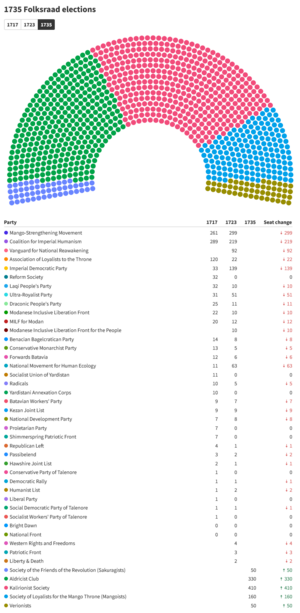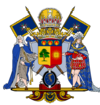1735 Shirerithian general elections
| |||||||
| |||||||
| Turnout Adelsraad: 5,943,002 Turnout Folksraad: 279,076,903 | |||||||
| |||||||
The 1735 Shirerithian general elections were a critical electoral event in the Imperial Republic of Shireroth, held amid the ongoing Shiro-Benacian War (despite warnings of impending doom by the Shadow Council of Rics) and following the politically charged postponement of the 1731 elections due to the Sathrati Emergency. These elections were conducted to fill seats in both the Folksraad (the lower chamber representing commoners) and the Adelsraad (representing the lower nobility). The electoral process was closely monitored as political tension within Shireroth reached new heights due to widespread dissatisfaction, and internal power struggles by Steward Thuylemans.
Background
The elections, originally scheduled for 1729 AN - and eventually 1731 AN -, were postponed indefinitely by the Second Thuylemans Government under the leadership of Louis Thuylemans in response to the escalation of the Sathrati conflict, which required the consolidation of national efforts. This move was initially tolerated by many due to the urgency of the crisis but gradually fueled resentment, particularly among the members of the Folksraad and portions of the Adelsraad who felt politically marginalized. The situation worsened with the launch of Bad Neighbour II by a grieving Kaiseress Salome, for which her cabinet took the blame and saw two parties (the Vanguard for National Reawakening and National Development Party) depart the coalition, effectively ending its majority. Only through emergency powers the cabinet remained in charge.
By 1734 AN, political unrest had grown, especially in response to economic hardship and public outcry from disenfranchised groups. Events like the Novi Nigrad Quarrels highlighted the people’s dissatisfaction and prompted the ruling government to finally schedule elections. To keep control over the situation, the Steward elevated the Adelsraad and Folksraad to the level of the Landsraad: effectively granting each Chamber equal powers. In the hope that the bickering Chambers would fail to form an united front against government policies, Louis Thuylemans forced through these reforms by Imperial Decree, rather than by law.
The 1735 elections became a test for the Thuylemans Government’s hold on power and for the future direction of the empire, with factions emerging to push for reform, stability, or reactionary policies.
Major Political Factions and Their Platforms
To avoid needless fracture of the Legislature in times of war, the government disbanded all parties. Every elected candidate was elected as independent Member of the Legislature. However, soon new factions arose among the ruins of the old parties:
- The Sakuragists (Society of the Friends of the Revolution): A radical faction advocating for the abolition of aristocratic privileges and the establishment of a secular and egalitarian society. Though a minority, their calls for sweeping reforms and grassroots representation resonated with some segments of the disenfranchised common folk.
- The Aldricists: Centered on the old Imperial Democratic Party (IDP) base, the Aldricists advocated for a constitutional monarchy and gradual democratization. With a significant but moderate following, they sought to preserve stability and avoid conflict, appealing to those wary of revolutionary change but desiring greater representation.
- The Kalirionists: Representing the royalist and conservative interests, the Kalirionists were the dominant political force, despite their internal divisions. Competing sub-factions within this group aligned with royal figures such as Crown Princess Kian, Prince Yukio, and Prince Atreyu, making the Kalirionist stance on various issues inconsistent and often divided.
- The Mangoists (Society of Loyalists for the Mango Throne): A reactionary group led by the influential writer Zhao Feng, the Mangoists sought to preserve traditional monarchy and counteract revolutionary sentiment. They gained support from conservatives who feared the destabilizing effects of reformist movements and desired a return to Shireroth’s historic values and structure.
- The Verionists: Known for their centralist and unionist views, the Verionists seek the centralisation of power in the empire, potentially at the expense of regional autonomy. Despite this, they attracted some support among those who viewed centralization as the path to a more efficient and unified state.
Election Results


As expected by Steward Thuylemans, the elections resulted in a closely divided Adelsraad and Folksraad, with no single faction achieving a decisive majority. The fragmentation of the Kalirionists and the rising influence of the Aldricists and Sakuragists highlighted the challenges of forming a stable government, particularly in the context of ongoing wartime pressures and social instability.
| Chamber | Party/Faction | Seats Won | Percentage |
|---|---|---|---|
| Adelsraad | Total Seats: 150 | ||
| Kalirionists | 68 | 45.3% | |
| Aldricists | 46 | 30.7% | |
| Mangoists | 25 | 16.7% | |
| Sakuragists | 7 | 4.7% | |
| Verionists | 4 | 2.6% | |
| Folksraad | Total Seats: 1000 | ||
| Kalirionists | 410 | 41.0% | |
| Aldricists | 330 | 33.0% | |
| Mangoists | 160 | 16.0% | |
| Sakuragists | 50 | 5.0% | |
| Verionists | 50 | 5.0% | |
Aftermath and Formation of Government
Following the elections, the Kalirionists struggled to consolidate power within the Adelsraad due to factional disagreements among their royalist sub-groups. Despite holding the largest share of seats, the Kalirionists’ fractured internal structure made it difficult to form an united front. The Aldricists, emerging as a moderate and pragmatic force, found common ground with the Kalirionist mainline faction and managed to broker a tentative coalition. However, the coalition’s instability reflected the broader divisions within the empire.
Under the Steward a new government, the Third Thuylemans Government, but its authority was severely weakened. In response to this, the Aldricists pushed for additional constitutional reforms, aiming to reduce the executive powers of the Steward and increase legislative checks (this in turn made the coalition government on the brink of collapse on several occassions). Despite Mangoist resistance, limited reforms were announced to address public unrest and maintain the appearance of responsiveness, albeit with the condition that significant military authority would remain centralized due to the ongoing Shiro-Benacian War. The Sakugarists found the democratisation a farce and kept radicalizing.
The Verionist faction refused to acknowledge the outcome of the election. Leader Hildebrand Verion made a speech that decried the election as a "blatantly fraudulent exercise in ballot-stuffing that allowed the Vanic forces that parade under the name of Harald-lover Aldric back into power and shows the dire need for freedom-loving Shirithians to organise themselves and withstand this onslaught of evil".
| |||||||||||
| |||||||||||||||||||||||||||||||||||||

